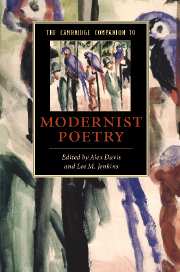Book contents
- Frontmatter
- Introduction
- Part I: Contexts
- Part II: Authors and Alliances
- 5 Pound or Eliot: whose era?
- 6 H.D. and revisionary myth-making
- 7 Yeats, Ireland and modernism
- 8 Modernist poetry in the British Isles
- 9 US modernism I: Moore, Stevens and the modernist lyric
- 10 US modernism II: the other tradition - Williams, Zukofsky and Olson
- 11 The poetry of the Harlem Renaissance
- 12 Caliban’s modernity: postcolonial poetry of Africa, South Asia and the Caribbean
- Part III: Receptions
- Guide to further reading
- Index
- Series List
10 - US modernism II: the other tradition - Williams, Zukofsky and Olson
from Part II: - Authors and Alliances
Published online by Cambridge University Press: 28 November 2007
- Frontmatter
- Introduction
- Part I: Contexts
- Part II: Authors and Alliances
- 5 Pound or Eliot: whose era?
- 6 H.D. and revisionary myth-making
- 7 Yeats, Ireland and modernism
- 8 Modernist poetry in the British Isles
- 9 US modernism I: Moore, Stevens and the modernist lyric
- 10 US modernism II: the other tradition - Williams, Zukofsky and Olson
- 11 The poetry of the Harlem Renaissance
- 12 Caliban’s modernity: postcolonial poetry of Africa, South Asia and the Caribbean
- Part III: Receptions
- Guide to further reading
- Index
- Series List
Summary
According to some accounts, the path-breaking work in American modernist poetry was done by expatriates like Ezra Pound, T. S. Eliot and Gertrude Stein, Americans who abandoned their relentlessly materialist and artistically unformed homeland to root themselves in the rich cultural humus of Europe. Just as significant, however, are the achievements of the 'nativist' poets whose work reflects both the cosmopolitan 'tradition' that Pound and Eliot sought in Europe and the immediate realities of the American scene. From New Jersey,William Carlos Williams forged a recognisably modernist poetry which is also irreducibly local and American. In Williams's wake, Louis Zukofsky and Charles Olson continued the experiments of this 'homegrown' modernism, in the process pushing American poetry into a mode that Olson would name 'post-modern'.
William Carlos Williams (1883-1963) was born in Rutherford, New Jersey, a distant suburb of New York City. His father was English, his mother Puerto Rican: 'Of mixed ancestry', he wrote Horace Gregory in 1939, 'I felt from earliest childhood that America was the only home I could ever possibly call my own. I felt that it was expressly founded for me, personally, and that it must be my first business in life to possess it.' Pound teased Williams about his immigrant forebears, even as he figured Williams's 'foreignness' as an advantage amid the derivative sentimentality of early twentieth-century American letters: 'And America. What the hell do you a blooming foreigner know about the place[?] . . . The thing that saves your work is opacity, and don't forget it. Opacity is NOT an American quality. Fizz, swish, gabble and verbiage, these are echt americanisch.'
- Type
- Chapter
- Information
- The Cambridge Companion to Modernist Poetry , pp. 181 - 194Publisher: Cambridge University PressPrint publication year: 2007

